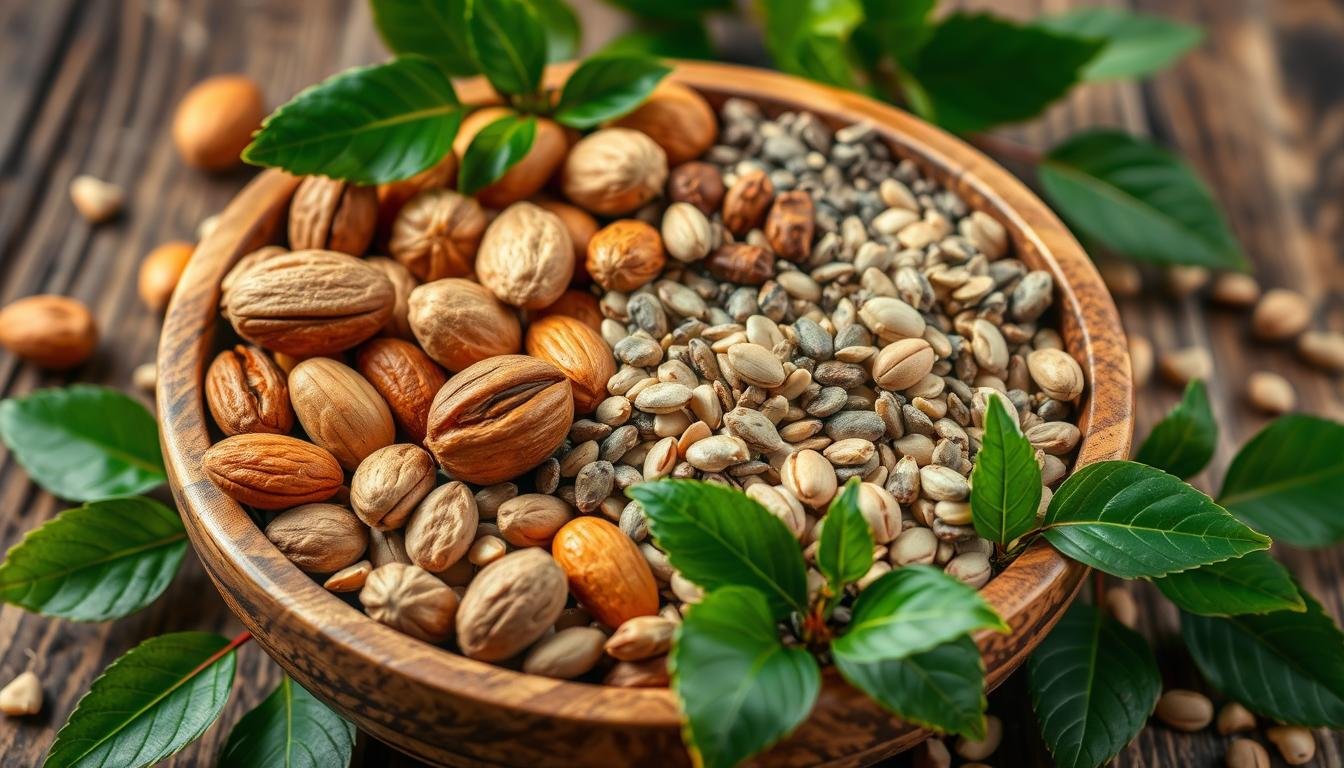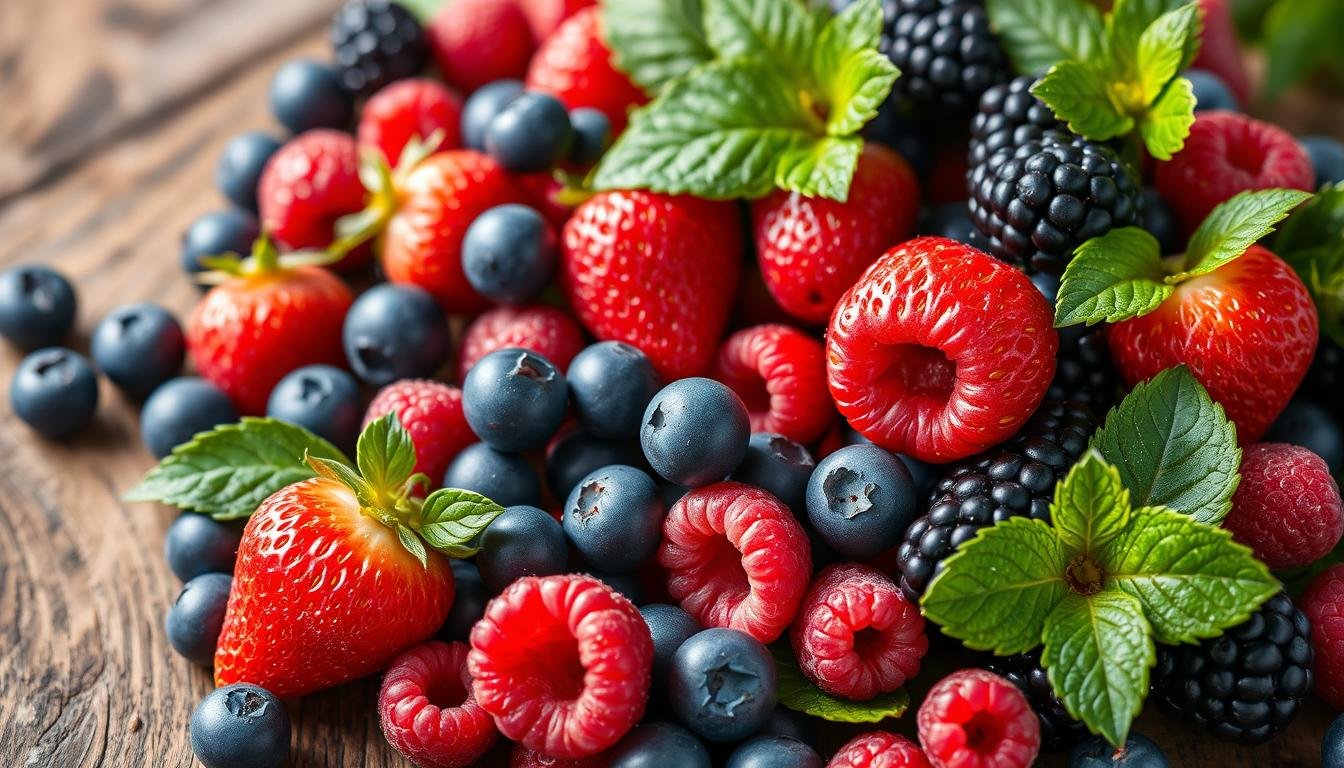Did you know about 80% of people think of food as a way to avoid illnesses? They pick what they eat to dodge problems like obesity and diabetes. This fact shows more folks are getting how science and superfoods work together to control blood sugar. This piece digs into superfoods and how they help manage and better blood sugar levels.
The craze for superfoods is going up because everyone wants to eat healthier. This part will show which foods are worth the buzz. You’ll see how a diet full of superfoods can change health, especially for those with diabetes.
Key Takeaways
- Many individuals now consider their diet a preventive measure against significant health issues.
- Superfoods can significantly influence blood sugar levels and overall health.
- Understanding superfoods helps in making informed dietary choices.
- Staying aware of the nutrient density of foods can optimize health outcomes.
- A growing market for superfoods reflects their importance in modern diets.
Introduction to Superfoods and Blood Sugar
Superfoods pack a huge nutritional punch in a small package. These nutrient-dense foods are full of health benefits yet low in calories. Their link to blood sugar management has gained attention as diabetes becomes more common. Studies praise superfoods for boosting metabolism and improving blood markers.
Eating right plays a big role in staying healthy. Australian research shows that good food habits can better metabolic health and BMI. Foods like berries have been linked to less insulin resistance, higher HDL cholesterol, and a lower risk of diabetes and metabolic syndrome.
Superfoods like turmeric, ginger, and garlic help control blood sugar. They are packed with phytochemicals that fight diabetes and heart disease. They also help lower bad cholesterol and haemoglobin A1c levels. Cocoa powder can decrease blood pressure and cut the risk of heart issues. Plus, green tea is great for boosting metabolism and overall health.
Evidence is building on the health boost from superfoods. They play a key role in blood sugar management and keeping diseases at bay. Their rich mix of vitamins, minerals, and antioxidants makes them a must in any diet.
The Science Behind Superfoods and Their Impact on Blood Sugar
Superfoods and Blood Sugar Regulation are closely linked. These foods have bioactive compounds that help with metabolic health and diabetes. They play a key role in controlling glucose levels.
This shows how certain foods can stabilize blood sugar. It offers insights for those who want to keep their levels steady.
Understanding Blood Sugar Regulation
Managing blood sugar is key for good health, especially for those with Diabetes Health. Foods like oats and chia seeds are high in fiber. They slow down how carbs are digested and sugars absorbed.
This leads to a steadier blood sugar level. Oily fish and flax seeds, rich in omega-3s, improve Insulin Sensitivity. This helps the body use insulin better.
The Role of Insulin Sensitivity
For blood sugar control, improving Insulin Sensitivity is essential. Foods such as berries and nuts are full of antioxidants. They keep cells safe from damage.
This protection lowers the risks of diabetes issues, like heart disease. Eating leafy greens, quinoa, and nuts helps. They balance blood sugar and cut down inflammation.
Adding superfoods to your diet is smart for blood sugar control. Eating these foods regularly and knowing their effects can help those with diabetes.
| Superfood | Key Benefits | Components Affecting Blood Sugar |
|---|---|---|
| Oats | Helps stabilize blood sugar and cholesterol levels | Beta-glucans, Fiber |
| Chia Seeds | Regulates blood sugar and reduces inflammation | Omega-3 fatty acids, Antioxidants |
| Berries | Protects against oxidative stress | Antioxidants |
| Nuts | Supports heart health | Fiber, Proteins |
| Oily Fish | Improves insulin sensitivity | Omega-3 fatty acids |
| Leafy Greens | Reduces chronic disease risk | Vitamins, Minerals |
What Defines a Superfood?
The term “superfood” grabs the attention of those looking to improve their health. Marketers use it often, yet the FDA does not officially define it. To understand superfoods, we delve into their Nutrient-Dense Characteristics. These foods are loaded with vitamins, minerals, antioxidants, and essential fats. They play a big part in enhancing health and wellness.
Characteristics of Nutrient-Dense Foods
Nutrient-dense foods pack a lot of nutrients with fewer calories. They are rich in health benefits and low in empty calories. Important Nutrient-Dense Characteristics are:
- Rich in vitamins and minerals, supporting bodily functions
- High in dietary fiber, promoting digestive health
- Loaded with antioxidants, combating oxidative stress
- Contains healthy fats, essential for nutrient absorption
- Low in added sugars and unhealthy fats
Common Examples of Superfoods
Knowing Examples of Superfoods can make choosing what to eat easier, especially for those monitoring their blood sugar. Some top superfoods are:
| Superfood | Nutritional Benefits |
|---|---|
| Berries | Rich in antioxidants, vitamins, and fiber; may help manage blood sugar |
| Leafy Greens | Low in calories and packed with vitamins A, C, and K |
| Legumes | Excellent sources of fiber, folate, potassium, and iron |
| Avocado | Provides fat-soluble vitamins and heart-healthy fats |
| Nuts | Good source of healthy fats, magnesium, and protein |
| Whole Grains | Rich in B vitamins, fiber, and minerals; aids in blood sugar management |
Adding these superfoods to your daily diet can lead to better health. This is especially true for those with diabetes. They benefit from these foods’ ability to manage blood sugar and provide energy all day.
Key Superfood Nutrients Affecting Blood Sugar
Understanding how Key Superfood Nutrients impact blood sugar is key. Magnesium and chromium are especially important for glucose control. By adding them to your diet, you can boost your health and manage blood sugar better.
Magnesium and Blood Sugar Control
Magnesium is not just for muscles and nerves; it’s key for controlling blood sugar too. Foods high in magnesium, like dark green veggies and whole grains, help with insulin sensitivity. Studies show that eating more magnesium lowers the risk of type 2 diabetes.
Chromium’s Role in Glucose Regulation
Chromium plays a huge role in blood sugar and insulin. It helps insulin work better, which improves how we process glucose. Getting enough chromium can help avoid blood sugar spikes, crucial for diabetes management. Nuts and dairy are great sources of chromium, so include them in your meals. For more on superfoods and blood sugar, check out this research here.
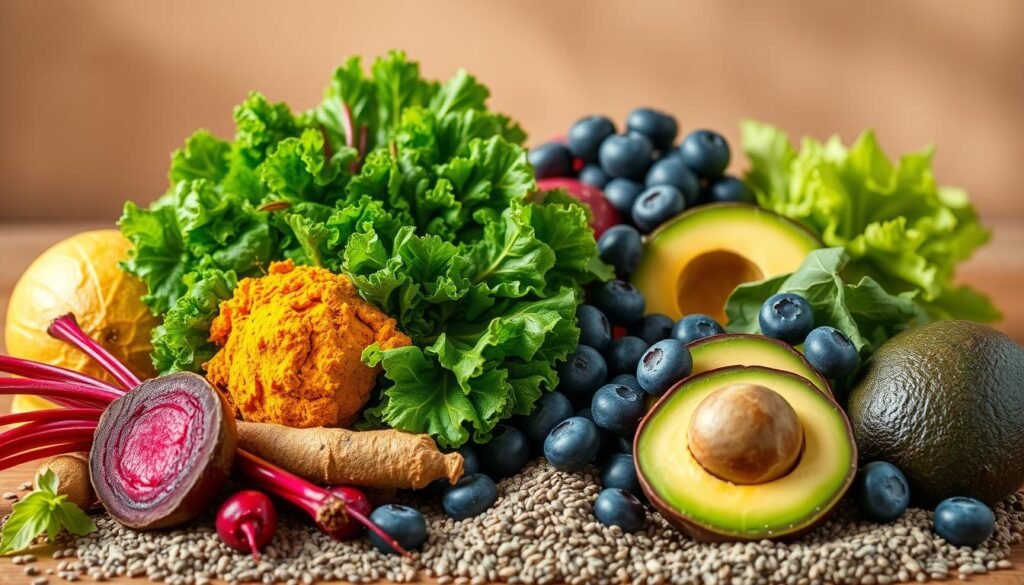
| Superfood | Primary Nutrient | Benefit |
|---|---|---|
| Dark Green Leafy Vegetables | Magnesium | Improves insulin sensitivity and reduces diabetes risk |
| Nuts | Chromium | Enhances insulin action and blood sugar control |
| Whole Grains | Magnesium | Supports healthy glucose metabolism |
| Dairy Products | Chromium | Aids in glucose regulation |
Glycemic Index: Why It Matters
The Glycemic Index (GI) is key for understanding how foods affect our blood sugar. It shows us the Glycemic Index Importance in choosing what we eat for better health. Foods rank as low, medium, or high on the GI scale. High-GI foods cause quick blood sugar spikes. In contrast, low-GI foods help keep blood sugar stable.
Understanding Glycemic Load vs. Glycemic Index
Managing blood sugar levels means knowing the difference between Glycemic Index and Glycemic Load. Glycemic Load Explained considers the portion size, giving a fuller picture of food’s effect on blood sugar. Eating ‘Minimize’ foods should be occasional, just a few times weekly. Choosing low Glycemic foods helps keep energy consistent and supports health.
Examples of Low Glycemic Foods
Including low Glycemic foods in your diet can better control glucose. Some good options are:
- Scrambled eggs with smoked salmon for breakfast
- Black bean soup for lunch
- Lamb shanks with barley for dinner
- Homemade full-of-fruit muffins for snacks
These food choices stabilize blood sugar and offer important nutrients. Learning about low GI foods and their health benefits is wise. For diet tips, check out resources like this article on the glycemic index and find out about superfoods here.
Antioxidants in Superfoods
Antioxidants are key in fighting off oxidative stress, which can lead to chronic diseases like diabetes. They make superfoods even more nutritious. Knowing about the antioxidants in superfoods shows how they help us stay well, especially with blood sugar control.
The Importance of Antioxidants in Health
Coffee is the top source of antioxidants in the American diet. But there are other antioxidant-rich superfoods, such as:
- Walnuts, pecans, and chestnuts, which are the top tree nuts for antioxidant content
- Dark chocolate with a cocoa content of 70% or higher, surpassing milk and white chocolate
- Blueberries, recognized for having the highest antioxidant levels among common fruits
- Cruciferous vegetables and leafy greens, which rank highly in nutrient density
How Antioxidants Help Regulate Blood Sugar
Studies show antioxidants help manage blood sugar levels. For example, people eating mangos saw better fasting glucose levels and lower inflammation. Eating herbs and spices like ginger, cinnamon, and turmeric also helped improve blood sugar and lipid profiles.
Antioxidants and insulin sensitivity are closely linked in superfoods. Foods like salmon, which is rich in antioxidants, boost metabolic health. Eating two servings of fatty fish each week is recommended for its benefits.
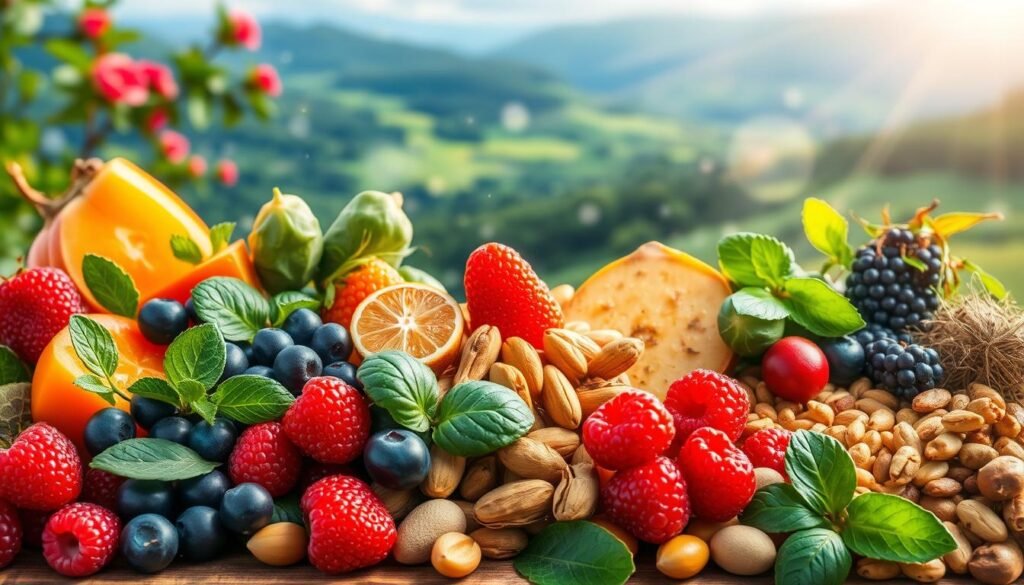
Adding antioxidant-rich foods to your diet aids in blood sugar control and boosts overall health. Knowing about the powerful compounds in superfoods allows for healthier food choices.
Anti-Inflammatory Properties of Superfoods
Understanding how inflammation and blood sugar relate is key for managing diabetes and good health. Chronic inflammation can lead to insulin resistance. This, in turn, can increase blood sugar levels. Eating anti-inflammatory superfoods may help fight inflammation. These foods have special components that tackle inflammation, helping control blood sugar.
The Link Between Inflammation and Blood Sugar
Studies show inflammation can mess with insulin signals. This creates a harmful cycle where high blood sugar levels make inflammation worse. So, eating superfoods reducing inflammation can have health benefits. For instance, one study had 27 overweight people eat 100 calories of mango every day for 12 weeks. They saw better fasting glucose levels and reduced inflammation.
Superfoods That Reduce Inflammation
Many superfoods have strong anti-inflammatory effects. Here are some top choices:
- Turmeric: Its active component, curcumin, helps lessen inflammation and boosts insulin sensitivity.
- Ginger: This spice may lower inflammation markers, aiding those with type 2 diabetes.
- Berries: Full of antioxidants, berries tackle oxidative stress and inflammation. They’re great for meals.
- Cinnamon: Linked to better body mass index and blood sugar management when eaten regularly.
Honey, rich in exosome-like nanoparticles, has shown to reduce inflammation in mouse studies of liver injury.
Adding herbs and spices to everyday food helped 71 people lower blood pressure. They followed a diet high in anti-inflammatory ingredients. Controlled trials with over 2000 individuals confirmed the positive impact of these superfoods reducing inflammation on health.
Techniques that extract active ingredients from seeds like flax, chia, and hemp show anti-inflammatory benefits. They also enhance insulin sensitivity in early studies. Adding these superfoods to meals can help balance blood sugar and reduce inflammation.
Research on superfood benefits keeps uncovering natural ways to better manage inflammation and blood sugar.
Impact of Plant-Based Diets on Blood Sugar Management
Eating more plant-based foods improves blood sugar control. Studies show that plant-based diets help keep glucose levels healthy. They give you vital nutrients and highlight the importance of functional foods in blood sugar regulation.
Benefits of Incorporating More Plants
Choosing a diet rich in plants offers many health advantages. For example:
- There’s a notable drop in type 2 diabetes rates, from 7.6% to 2.9%, in vegans.
- Whole grains and legumes increase insulin sensitivity due to their fiber.
- Plant-based diets, low in animal fat, reduce the risk of diabetes linked to obesity.
Functional Foods and Their Effects
Functional foods like whole grains, legumes, and certain fruits and veggies help stabilize blood sugar. They work by:
- Regulating glucose with their fiber content.
- Providing essential nutrients for glucose metabolism.
- Lowering inflammation linked to insulin resistance.
Choosing a plant-based diet is a smart move for better blood sugar control. Focusing on functional foods helps manage insulin and diabetes effects.
Phytochemicals and Their Benefits
Phytochemicals are compounds found in plants. They are known for their health benefits, particularly in superfoods. They play a key role in maintaining our health and fighting diseases. Knowing about these benefits helps people choose the right foods for their diet.
Understanding Phytochemicals in Superfoods
Benefits of phytochemicals show in various studies. For example, beta-cryptoxanthin may cut down the risk of some cancers. Lycopene can reduce the risk of heart disease by 14%. Also, glucosinolates in vegetables lower the chances of getting breast and prostate cancer. Adding foods rich in phytochemicals to our diet boosts our health greatly.
How Phytochemicals Influence Blood Glucose
Phytochemicals are crucial in managing blood glucose. They improve insulin sensitivity and lower sugar levels. For instance, sulforaphane from broccoli and omega-3 from fish are very helpful. Foods like avocados, beans, and nuts, including almonds and peanuts, also regulate blood sugar well. This makes eating a variety of superfoods great for controlling blood glucose.
| Phytochemical | Source | Health Benefits |
|---|---|---|
| Beta-cryptoxanthin | Fruits like papaya and peaches | Reduced risk of several cancers |
| Lycopene | Tomatoes and watermelon | Lower heart disease risk |
| Glucosinolates | Broccoli and Brussels sprouts | Reduced risk of multiple cancers |
| Flavonoids | Berries and apples | Improved blood sugar regulation |
| Resveratrol | Red wine and grapes | Heart health support and longevity |
Adding superfoods to our daily diet improves our health and helps prevent chronic diseases. Research keeps showing us the amazing benefits of phytochemicals. By using this knowledge, we can improve our health.
Practical Tips for Including Superfoods in Your Diet
Including superfoods in your daily meals boosts nutrition and helps manage blood sugar. You can easily make them part of your diet with some smart planning. Here, you’ll find tips to help integrate these powerful foods into meals, making them balanced and healthy.
Simple Ways to Add Superfoods to Meals
Adding superfoods into your meals is simple with these tips:
- More Vegetables: Make half your plate non-starchy veggies like kale, spinach, and broccoli.
- Balanced Proteins: Use lean proteins such as chicken, fish, and plant-based choices like quinoa and beans.
- Quality Carbs: Fill a quarter of your plate with starchy veggies and whole grains for a complete meal.
- Reduce Added Sugars: Cut down on added sugar to better manage blood sugar levels with smarter food choices.
- Healthy Fats: Opt for fats that are good for your heart, like avocados and olive oil.
Meal Planning with Superfoods
Planning meals ahead can make adding superfoods easier. Here are some tips:
- Plan Ahead: Make a weekly menu that includes diverse superfoods, like beans, salmon, and berries, for varied nutrition.
- Cook in Batches: Cook large amounts of superfood-rich dishes, such as quinoa and legumes, to enjoy all week.
- Experiment with Recipes: Try adding superfoods to meals you love. For example, put spinach in smoothies or chia seeds on yogurt.
- Healthy Snacks: Have healthy snacks ready, like nuts, to keep hunger at bay while boosting nutrition.
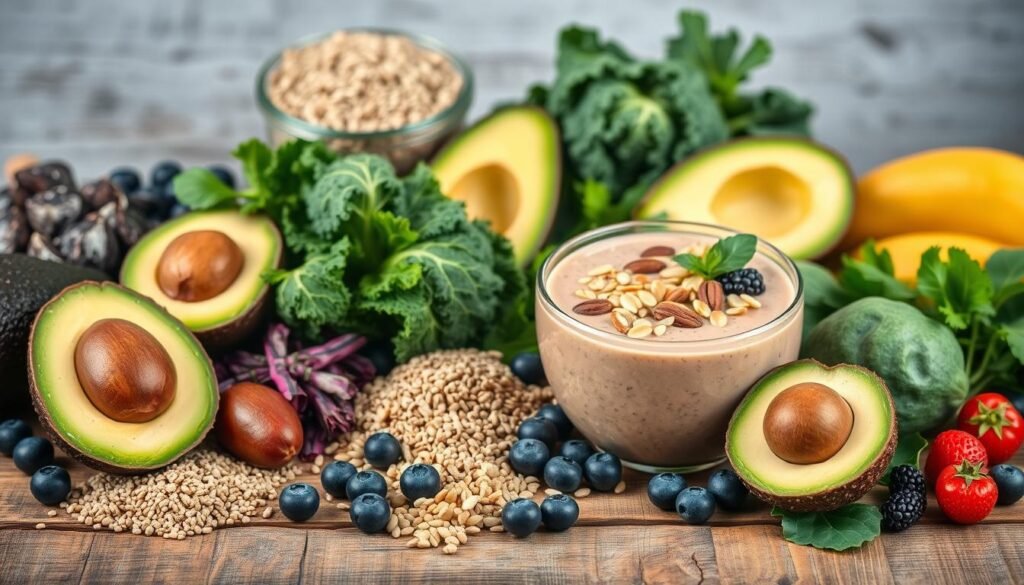
Superfoods, like berries and spinach, offer key nutritional benefits, especially for blood sugar control. By using these tips, meal planning with superfoods becomes enjoyable and great for your health.
Research Overview on Superfoods and Diabetes
Recent studies explore the role of superfoods in blood sugar control, focusing on diabetes. They have identified foods that help manage blood glucose. These foods can improve your metabolic health and diabetes control.
Key Studies Linking Superfoods to Improved Blood Sugar Levels
Eating cruciferous vegetables, like broccoli, shows strong antidiabetic effects. These superfoods increase insulin sensitivity and lower blood sugar. Fatty fish helps in managing blood sugar after meals too.
Research shows pumpkin extracts lower blood glucose significantly. Nuts, including peanuts and almonds, also help regulate blood sugar levels.
Okra can naturally lower blood sugar. It shows that flaxseed reduces HbA1c in those with type 2 diabetes. Beans and lentils, high in fiber and magnesium, lower blood sugar well.
Fermented foods like kimchi improve blood sugar and insulin sensitivity. Chia seeds, rich in antioxidants and omega-3s, also reduce blood sugar levels.
Diets high in magnesium, from foods like pumpkin seeds, may lessen diabetes risk. Spinach, loaded with potassium, helps reduce diabetes risk. Cinnamon is known to help lower blood sugar levels, improving metabolic health.
Conclusion
Superfoods play an important role in controlling blood sugar. You can’t rely on just one food to cure diabetes. But, adding foods like broccoli, salmon, and seeds helps a lot.
These superfoods do more than lower blood sugar. They boost insulin sensitivity and improve overall health. They give our body the vitamins and minerals it needs.
Eating a variety of superfoods like beans, berries, and fermented foods is key. They manage blood sugar and help us live healthier lives. As we learn more about these foods, it’s important to eat different ones that are rich in nutrients.
Making better food choices leads to better health and a brighter future. By focusing on whole foods, we can enjoy all the good things superfoods offer. This way, we support our health and keep our blood sugar in check.

